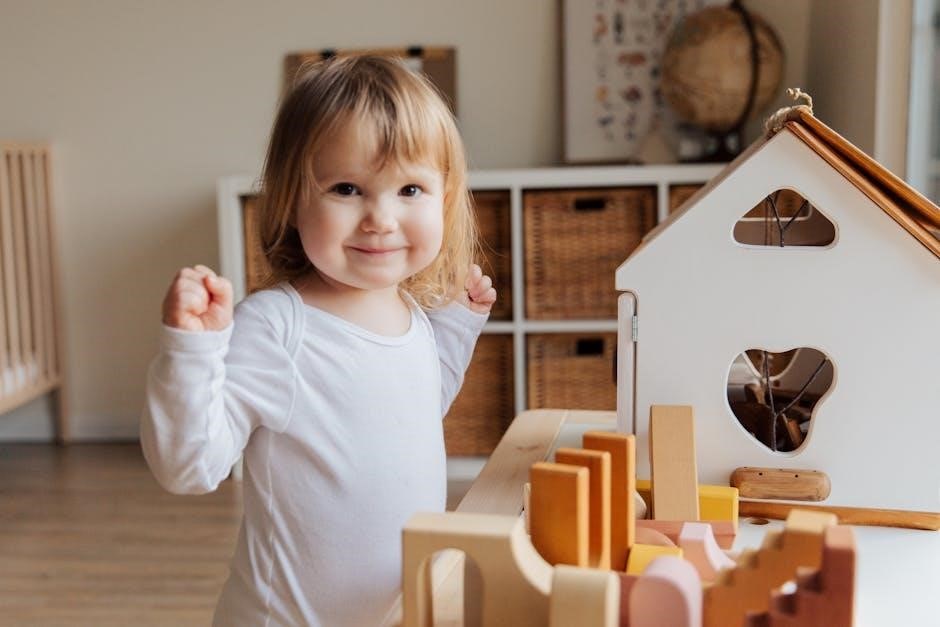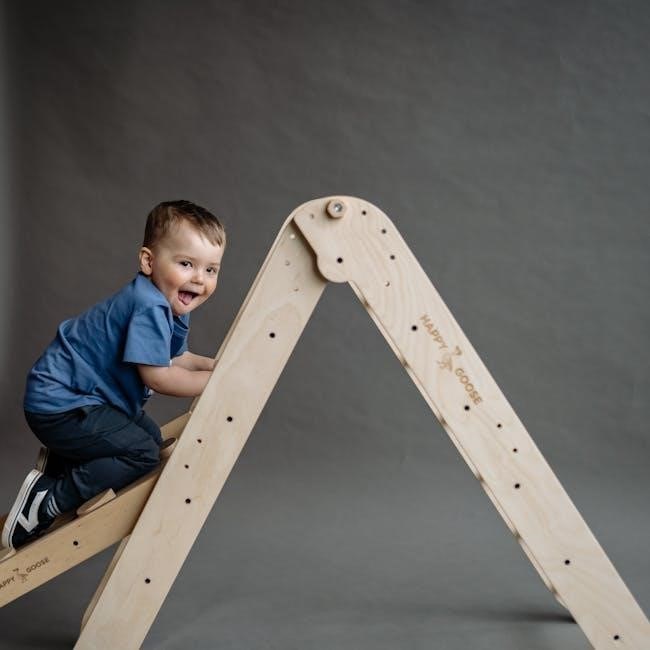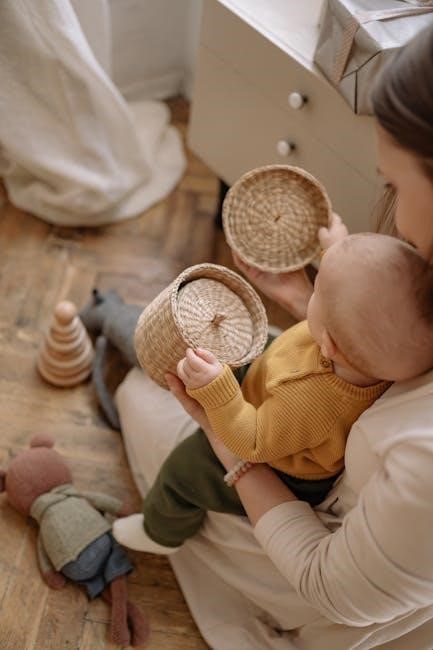Play development stages outline how children progress from solitary to cooperative play‚ fostering creativity‚ social skills‚ and cognitive growth through exploration and interaction.
Importance of Play in Child Development
Play is essential for children’s cognitive‚ social‚ and emotional growth. It fosters creativity‚ problem-solving‚ and critical thinking while helping children understand cause and effect. Through play‚ kids develop social skills like cooperation‚ communication‚ and empathy. It also builds self-confidence and resilience‚ enabling them to navigate challenges. Play supports physical development‚ improving coordination and motor skills. It provides an outlet for emotional expression and stress relief‚ helping children process their experiences. Playful interactions with adults and peers shape their understanding of relationships and cultural norms. By engaging in play‚ children explore and make sense of the world‚ laying a foundation for lifelong learning and personal development. Recognizing its significance‚ educators and caregivers prioritize play as a cornerstone of early childhood education and healthy development.
Overview of Play Development Stages

Play development stages outline the progression of children’s play behaviors‚ reflecting their growth from solitary activities to complex social interactions. These stages are universally recognized and essential for healthy development. They begin with solitary play in infancy‚ where children explore their environment independently. As they grow‚ they transition to parallel play‚ engaging in similar activities alongside others without direct interaction. This evolves into associative play‚ where children start to share materials and cooperate‚ though not in structured ways. Finally‚ cooperative play emerges‚ characterized by collaborative efforts‚ shared goals‚ and advanced social skills. Each stage builds on the previous one‚ fostering creativity‚ problem-solving‚ and emotional intelligence. Understanding these stages helps caregivers and educators support children’s developmental needs effectively‚ ensuring they thrive socially‚ cognitively‚ and emotionally.

Theoretical Frameworks for Play Development
Theoretical frameworks‚ such as Piaget’s cognitive stages and Parten’s social play taxonomy‚ provide structured insights into how play evolves‚ shaping understanding of child development and learning processes.
Piaget’s Stages of Cognitive Development Through Play
Jean Piaget’s theory identifies four stages of cognitive development‚ deeply intertwined with play. The sensorimotor stage (0-2 years) involves sensory exploration and motor skills through repetitive actions‚ like shaking a rattle. Preoperational (2-7 years) sees imaginative play‚ where children engage in pretend scenarios‚ fostering symbolic thinking; Concrete operational (7-11 years) involves logical problem-solving through constructive play‚ such as building with blocks. Finally‚ formal operational (12+ years) encourages abstract thinking via role-playing complex social roles. Each stage reflects advancing cognitive abilities‚ with play serving as a primary catalyst for learning and understanding the world. Piaget emphasized that play is not just entertainment but a vital tool for intellectual and social growth‚ shaping how children interact with their environment and develop critical thinking skills.
Parten’s Stages of Social Play Development
Mildred Parten identified six stages of social play‚ highlighting how children progress from solitary to cooperative interactions. The first stage‚ unoccupied play‚ involves children observing without engaging. Solitary play sees them playing alone‚ focused on their own activities. Onlooker play occurs when children watch others but don’t join in. Parallel play involves playing alongside others with similar toys but without direct interaction. Associative play introduces sharing and simple interactions‚ like taking turns. Finally‚ cooperative play involves collaborative efforts‚ such as team games or group projects‚ demonstrating advanced social skills. These stages reflect children’s growing ability to interact‚ communicate‚ and build relationships‚ laying the foundation for lifelong social competence and emotional intelligence.

Significance of Each Play Development Stage
Each play stage fosters unique skills‚ from creativity to problem-solving‚ enabling children to develop socially‚ emotionally‚ and cognitively while building a strong foundation for future growth and independence.
Solitary Play: Infancy to 2 Years
Solitary play marks the beginning of independent exploration‚ where infants engage in self-directed activities like mouthing toys or observing surroundings. This stage‚ spanning from birth to approximately 2 years‚ is crucial for cognitive development as children learn cause-and-effect relationships and object permanence. Solitary play fosters creativity‚ problem-solving skills‚ and motor development‚ allowing children to master basic abilities without external influence. It also builds concentration and self-reliance‚ laying the groundwork for future learning. During this phase‚ children are entirely focused on their own discoveries‚ with little interest in interacting with others. Adults should provide a safe environment and appropriate toys‚ allowing children to explore freely while ensuring their safety. This stage is essential for developing foundational skills that will support more complex forms of play in later years.
Parallel Play: 2-3 Years
Parallel play occurs when children play alongside each other‚ often with similar toys‚ but do not interact directly. This stage typically emerges between 2 to 3 years of age and serves as a transitional phase toward more interactive play. During this period‚ children begin to show interest in their peers but are not yet ready to engage in cooperative activities. Parallel play helps children develop social awareness and comfort in group settings while still maintaining independence. It fosters observational skills‚ as children watch and imitate others‚ laying the groundwork for future social interactions. Adults can encourage parallel play by providing similar toys and shared spaces‚ allowing children to gradually become accustomed to the presence of others. This stage is crucial for social-emotional growth‚ as it bridges solitary play and more collaborative forms of interaction.
Associative Play: 3-4 Years
Associative play marks a significant step in social development‚ occurring around 3 to 4 years of age. Children begin to interact with peers more directly‚ sharing toys and engaging in simple‚ loosely structured activities. Unlike parallel play‚ associative play involves communication and cooperation‚ although the interactions may still be fleeting or disorganized. For example‚ children might take turns without a clear goal or collaborate on a basic task. This stage fosters essential social skills‚ such as sharing‚ empathy‚ and basic problem-solving. Adults can support associative play by providing opportunities for group activities and encouraging positive interactions. This phase is vital as it prepares children for more complex collaborative play‚ enhancing their ability to form relationships and work together toward shared objectives. Associative play is a foundational step in developing lifelong social competencies.
Cooperative Play: 4 Years and Beyond
Cooperative play emerges around 4 years of age‚ marking a significant milestone in social and cognitive development. At this stage‚ children engage in structured‚ goal-oriented activities with peers‚ demonstrating an understanding of rules and roles. They work together toward shared objectives‚ such as in board games‚ team sports‚ or group projects. Cooperative play fosters advanced social skills‚ including communication‚ problem-solving‚ and conflict resolution. Children also develop emotional intelligence‚ learning to negotiate‚ compromise‚ and show empathy. Adults can support this stage by encouraging collaborative activities and modeling positive interactions. Cooperative play is crucial for building strong peer relationships and preparing children for future social and academic challenges. It reflects a child’s growing ability to think critically and function as part of a team‚ laying the foundation for lifelong social and collaborative competencies.

Connection Between Play Stages and Cognitive Development
Play stages significantly influence cognitive development by enhancing problem-solving skills‚ understanding cause and effect‚ and fostering creativity through interactive and imaginative activities‚ building critical thinking abilities.
Functional Play: Understanding Cause and Effect
Functional play is the earliest stage of play development‚ typically occurring from birth to 2 years. During this stage‚ children engage in repetitive actions‚ such as shaking a rattle or dropping a spoon‚ to explore their environment and understand cause and effect. This type of play is crucial for cognitive development as it helps children learn about the consequences of their actions and develop problem-solving skills. Functional play is often solitary and focuses on sensory exploration‚ laying the foundation for more complex forms of play in later stages. It is a vital part of early childhood development‚ enabling children to make sense of the world around them through hands-on experimentation and discovery.
Constructive Play: Building and Creating
Constructive play involves building and creating‚ fostering creativity and fine motor skills. Children typically engage in this type of play from 2-3 years onward‚ using materials like blocks‚ LEGO‚ or sand to create structures. This stage enhances problem-solving abilities and hand-eye coordination‚ as children experiment with shapes‚ textures‚ and balance. Constructive play also encourages logical thinking and innovation‚ allowing children to bring their ideas to life. It is a foundational step in cognitive development‚ helping children understand spatial relationships and develop patience. Over time‚ constructive play evolves into more complex creations‚ reflecting the child’s growing imagination and dexterity. This form of play is essential for nurturing creativity and laying the groundwork for future academic and practical skills.
Dramatic Play: Role-Playing and Pretend Play
Dramatic play‚ or pretend play‚ emerges around 3-4 years‚ where children engage in role-playing and imaginative scenarios. This stage fosters creativity‚ emotional intelligence‚ and social skills. Children often imitate adult behaviors‚ creating stories and characters to act out. Dramatic play enhances problem-solving abilities and encourages empathy by exploring different perspectives. It also strengthens language skills through dialogue and narrative creation. Pretend play allows children to express emotions and ideas safely‚ helping them make sense of the world. This type of play is crucial for cognitive development‚ as it promotes abstract thinking and the understanding of cause-and-effect relationships. Dramatic play also lays the groundwork for cooperation and teamwork‚ as children collaborate to create shared narratives. By engaging in pretend play‚ children develop essential life skills while exploring their imagination and creativity. This stage is a cornerstone of early childhood development‚ enriching both social and cognitive growth.

Role of Play in Social Development
Play fosters social skills‚ cooperation‚ and empathy‚ enabling children to navigate interactions and understand others’ perspectives‚ crucial for emotional growth and lifelong relationships.
Developing Social Skills Through Play
Play serves as a cornerstone for social development‚ enabling children to acquire essential skills such as communication‚ empathy‚ and cooperation. Through solitary and cooperative play‚ children learn to express emotions‚ resolve conflicts‚ and understand roles. Early stages like parallel play encourage sharing and turn-taking‚ while cooperative play fosters teamwork and problem-solving. Role-playing and pretend play enhance understanding of social norms and cultural values. By engaging in these activities‚ children develop confidence‚ self-awareness‚ and the ability to form meaningful relationships. Playful interactions provide a safe environment for experimenting with social dynamics‚ preparing children for future interactions in diverse settings. These experiences are vital for building a strong foundation in emotional and social intelligence‚ which are critical for lifelong success; Play thus acts as a natural and effective medium for social skill development.
Importance of Adult Involvement in Play
Adult involvement in play significantly enhances children’s developmental outcomes by providing guidance‚ support‚ and enrichment. Adults can scaffold learning by introducing new concepts‚ encouraging creativity‚ and modeling social behaviors. Through active participation‚ adults foster a sense of safety and security‚ allowing children to explore and take risks confidently. Engaging in play alongside children helps adults understand their interests and strengths‚ tailoring interactions to meet individual needs. Additionally‚ adults can teach problem-solving strategies and promote positive conflict resolution‚ which are crucial for social development. Regular adult involvement strengthens the child-adult bond‚ fostering emotional well-being and resilience. By being playful role models‚ adults inspire curiosity and imagination‚ laying a strong foundation for future academic and social success. This active role ensures play becomes a dynamic and impactful learning experience.
Understanding play development stages is crucial for fostering creativity‚ social skills‚ and cognitive growth. Future research and applications in education and child-rearing will further enhance playful learning experiences.
Implications for Education and Child Rearing
Understanding the stages of play development has profound implications for education and child-rearing. Recognizing these stages allows educators and caregivers to create environments that support natural cognitive‚ social‚ and emotional growth. By aligning activities with a child’s developmental stage‚ adults can foster creativity‚ problem-solving‚ and collaboration. Play-based learning strategies‚ for instance‚ can be tailored to enhance engagement and understanding. Parents and teachers should encourage independent exploration during solitary play while gradually introducing cooperative activities as children progress. This balanced approach nurtures confidence and social competence. Integrating play into educational curricula ensures that children develop essential life skills‚ such as teamwork and critical thinking‚ in a joyful and meaningful way. Ultimately‚ embracing play as a foundational learning tool prepares children for future success in both academic and interpersonal realms.
The Role of Play in Modern Educational Systems
Modern educational systems increasingly recognize play as a vital component of learning‚ moving away from traditional rote methods. Play-based curricula are now integrated into classrooms‚ fostering creativity‚ critical thinking‚ and collaboration. Educators use stages of play development to design activities that align with children’s cognitive and social growth. For instance‚ functional and constructive play help children grasp abstract concepts through hands-on exploration. Dramatic play encourages emotional intelligence and empathy‚ while cooperative play builds teamwork and communication skills; By embedding play into the curriculum‚ schools create engaging‚ child-centered environments that cater to diverse learning styles. This shift reflects a broader understanding that play is not just recreation but a powerful tool for holistic development‚ preparing children for academic and personal success in an ever-evolving world.



